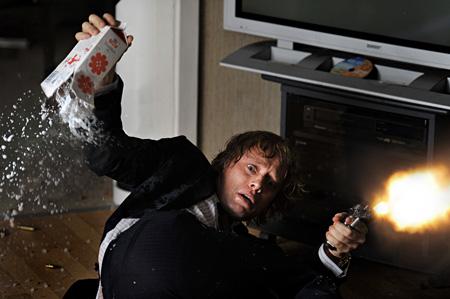"The Killing" was an unexpected hit on British BBC4 last winter. The Danish TV series drew more viewers than "Mad Men", even though it was shown in the original language with subtitles, not usually something that attracts English-speaking audiences.
In the USA, AMC, the channel that airs "Mad Men", has remade "The Killing". The series that asks "Who Killed Rosie Larsen?" premiered in April to a very favourable reception by critics and viewers.
20 days, not 24 hours
This despite the fact the series has no car chases, explosions, serial killers or sexy, hard-hitting stiletto detective in the lead – just a chief investigator who "barely ever changes her sweater," as a New York Times critic wrote about the Danish original.
The attraction of "The Killing", many say, is its leisurely pace and rooting in reality. Piv Bernth, who produced the original series for the Danish Broadcasting Corporation, DR, says the difference between the US and Europe is that, whereas a series like "24 Hours" spent just one day unspooling a criminal intrigue, European series take their time. "The Killing" unwinds over 20 days, shortened to 13 in the American remake.
"We take time to reflect. We are concerned about what the crime that's committed in the series means to society and those directly affected by it. We get to immerse ourselves in the characters and I think that's very appealing to international audiences," Piv Bernth says.
The "Millennium" wave
Arguably, the runaway success of the films from Stieg Larsson's "Millennium" trilogy has blazed a trail for Scandinavian mysteries on TV and for the more ambitious and pricier mystery films with broad international appeal that are in the pipeline. An adaptation of the Norwegian writer Jo Nesbø's "Headhunters", starring Nikolaj Coster-Waldau, will release in a few months and has already been picked up by Magnolia, the major North American theatrical distributor. Moreover, Lasse Hallström is returning from Hollywood to direct the adaptation of the Swedish bestseller "The Hypnotist", which will be the director's first Swedish film since 1987.
Rikke Ennis, chief executive of TrustNordisk, which is handling the international sales of "Headhunters", is convinced that the film, with a format and appeal similar to the "Millennium" trilogy, will be the next big hit in the Scandinavian noir genre.
"We are obviously riding a wave after the success of 'Millennium'. Those films showed that we have a special touch with mystery productions in Scandinavia. Hence the big focus on Scandinavian mysteries right now," Rikke Ennis says.
Peter Bose, a producer at Miso Film, which brought us the adaptations of the Norwegian writer Gunnar Staalesen's "Varg Veum" series of detective novels and the Danish TV series "Those Who Kill", sees Scandinavia making a new mark on the international map.
"I believe that the success of Scandinavian noir will open up opportunities in the same way that the Dogme concept once did," he says. Ennis shares that expectation. "Mystery films are a new niche for us and I can see it developing into a new wave."
From Bergman to von Trier
Søren Stærmose, executive producer at Yellow Bird, which brought us the "Millennium" films, sees several reasons for the booming interest in Scandinavian mysteries.
"We can make films with high production values for four to five million euros, which is a lot of money for a film in a Scandinavian context, but not so bad compared to English-language productions," he says. "We can keep costs down because we don't have to pay stratospheric star salaries, like they do in the US. Our crews are smaller and work across functions, shoots are generally shorter and we have really well-trained film workers and good screenwriters. Together that makes for an efficient system."
Moreover, Stærmose says, it is interesting for international audiences to get glimpses of real life in Scandinavia, a way of life that's unfamiliar to most and tinted by preconceptions. "Thanks in part to the 'Millennium' trilogy, people now have a new way of looking at Sweden, and at Scandinavia in general."
"We have traditionally been considered ideal societies. We have gender equality, social safety nets, free education and so on. But the crime films also show another, darker side of our everyday life," Stærmose says. In fact, he asserts, this is right along the lines of the Scandinavian film tradition of taking up painful subjects, as seen in Bergman, von Trier and others.
Bernth seconds Stærmose's observation. "We have long been told that Scandinavians were some of the happiest people in the world. But the mysteries paint a more complex and conflicted picture."
Suspense etched in ice and cold
Gunhild Agger, professor of media studies at Aalborg University, also points to the international appeal of the Scandinavian settings. "The Swedes, in particular, have excelled at exploiting spectacular sceneries of ice and cold that set an excellent tone for a mystery," she says.
Apart from the realism of the locations, major reasons for the current popularity of Scandinavian noir are their top production values and skilful acting.
"We have learned from successful, well-made mysteries from abroad and we have added our own touch," Agger says. "So, our series and films are traditional enough to seem familiar to people elsewhere in the world and just new enough to surprise us. They're a suitable blend of new and old."
This is a slightly edited version of an article from our Cannes festival magazine FILM#72.
